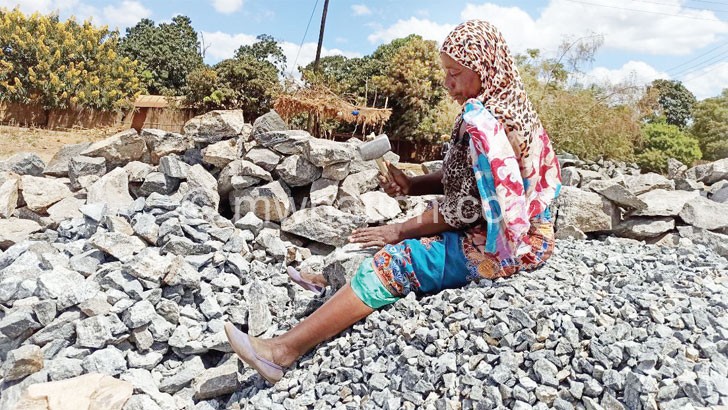Breaking stones to make ends meet
Since the year 2000, Rhoda Kathewera has been mining quarry near Kamuzu Institute for Sports in Lilongwe City.
The mother of seven narrates how she has been fending for her family from the quarry business.
Says Kathewera: “I used to be a housewife and was not doing any piecework. I then decided to join the quarry business to help my husband in paying the bills, including school fees for the children.”
Today, she is a proud owner of a house and she gives all the credit to her business which she says has been her ticket out of poverty.

Every day, Kathewera wakes up around 4am to search for quarry stones.
“Since we do not have a hill nearby, my colleagues and I normally buy the stones from miners from Bunda Hill. They are then broken down to quarry stones here,” she says.
A wheelbarrow full of stones is worth K2 000 and a one-tonne vehicle costs about K20 000.
There are at least 73 miners at the site and 43 of them are women.
With time, since 1994 when the mine was established along Chidzanja Road in the Capital City, the miners decided to come up with a committee to look after their welfare and Kathewera was elected deputy chairperson.
She says: “We needed a team to be looking after all of us. And we came up with a suggestion to formulate a 10-member committee to lead activities at the site.
“Sometimes we face resistance from buyers and it is this committee that helps to resolve such conflicts. By and by, we have now realised that this is our home and we need to treat it as such.”
Kathewera’s main challenge is lack of support from indigenous construction companies.
“There are many people at this mine, and we are very confident that we can supply quarry stones to a construction company if we can join hands, but we do not see them coming to us.
“If we could have that kind of support, our lives would change tremendously because the only customers that we have now are small ones and normally those building residential houses. So, our plea is for more support from the construction industry,” she adds.
Yona Samuel is the chairperson for the Institute Quarry Miners Association. He adds that when it comes to health hazards, they try to sensitise each other to how they can protect themselves.
He says: “It was only in 2019 when Ministry of Health officials came to sensitise us to how to be safe. A number of miners had their tuberculosis [TB] tests done and that was encouraging.
“However, our only worry is that we do not have the materials to help us work better. A miner needs gloves and masks, which are a bit expensive for us. Sometimes we have them, but sometimes we don’t. So we only drink milk when we have money as a measure of protecting ourselves when exposed to dust.”
Samuel says he has been a miner since 1994 and has tried to do other businesses outside quarry mining, but his did not improve.
He says: “I am a miner with passion for what I do and for all these years, I have seen some people growing in this profession while some have been falling.
“I think time has come for our policymakers to help those with the potential of helping themselves first. For example, we have people here who are hard workers and if given incentives or business capital, they can do well.”
Lilongwe District Health Office assistant environmental health officer Maclean Zatuba Nkhoma says quarry mining has left miners suffering from TB, silicosis (a lung disease caused by breathing in tiny bits of silica, a mineral that is part of sand, rock, and mineral ores such as quartz) and injuries, among others, which take as long as 10 to 30 years to manifest themselves.
He advises miners to wear personal protective equipment such as masks, heavy-duty gloves and not take clothes worn during mining to their homes.
“Miners should wet the mining area often to avoid dust and they should be resting to reduce exposure and at the same time, they should be having medical check-ups at least once a year,” says Nkhoma.
To protect the public, the environmental health officer suggests that vehicles transporting quarry stones should be covered with a tent or the quarry should be sprayed so that no dust ends up being inhaled by the public.
Occupational health specialist Dr Yotam Moyo says due to the already overwhelmed condition of Malawi’s health system, it is often difficult to add more responsibilities to clinicians to start assessing occupational issues.
“In the current scenario where there is no law protecting them in their practice and no designated walk-in facilities to have them tested, they should make sure that each year they get an assessment of their well-being.
“The ideal situation is to have some designated government facilities for assessment of these people where they can conduct outreach surveillance for these self-employed people which can obviously calls for more resources,” he adds.





